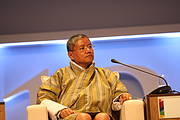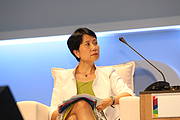Green growth: over-burdened by scepticism?
09 September 2012 | News story
Tonight, the World Leaders Dialogue at the IUCN Congress started with an easy question. Yes, green growth can be a reality. But a flow of questions from the audience reflected several concerns including how to make it real and market-driven in a world with seven billion people to feed and how to convince sceptics that green growth is worth the extra cost.
Mr Soogil Young, Co-Chair of the Presidential Committee on Green Growth opened the floor with a proposal of building a “Global Architecture for Green Growth”. He explained that this is a long term approach of “growing by greening”, which requires several steps starting from strong political commitment and continuing on to investment in technology and innovation.
Mr Achim Steiner, Executive Director of the United Nations Environment Programme highlighted the idea of understanding sustainable development/greening the economy as a transition process. “Transitions have to begin somewhere, transitions can take place and we have many examples.” Decisions need to be made by governments but civil society has a strong role to play, he said.
Questions continued to flow throughout the session: Is Bhutan’s example achievable? Which business sectors are leading the way with their green growth strategies? How to balance natural capital with finance capital, in a world ruled by finance capital?
Ms. Heidi Anneli Hautala, Minister of International Development and Ownership Steering Issues, Finland, uses the expression of “Green Inclusive Economy”. She believes that growth is possible, but not at the cost of the environment and that economic development must be also for the poor and for the most vulnerable. She mentioned the importance of civil society and its role in the progress towards environmental sustainability.
Mr. Peter Bakker, President of the World Business Council for Sustainable Development considers that green growth is a necessity and that we need to move forward to accomplish this goal. “This is not going to be a story of incremental change this requires a radical transformation”. For capitalists, Bakker suggests to take into account natural capital and social capital.
There was no shortage of solutions proposed by the panel on how to make green growth a reality:
Put natural and social capital into the accounting rules for business to balance growth; form a coalition to implement green growth, make hard decisions, look for happiness and well-being, try to achieve a global financial transaction tax and have an agreement with all nations that revenues will be directed to environmentally sustainable development, push for a green energy revolution, pay attention to food security and the future of agriculture.
It was clear that there is a lot of work to be done to make green growth a reality. But green growth demands rapid changes. As one of the panelists said, green growth has become a moral question for everyone, since it is about changes to make our economies and lifestyles truly sustainable.





